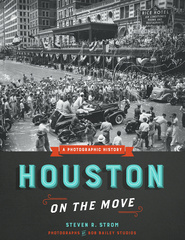
Power Moves
Transportation, Politics, and Development in Houston
Since World War II, Houston has become a burgeoning, internationally connected metropolis—and a sprawling, car-dependent city. In 1950, it possessed only one highway, the Gulf Freeway, which ran between Houston and Galveston. Today, Houston and Harris County have more than 1,200 miles of highways, and a third major loop is under construction nearly thirty miles out from the historic core. Highways have driven every aspect of Houston’s postwar development, from the physical layout of the city to the political process that has transformed both the transportation network and the balance of power between governing elites and ordinary citizens.
Power Moves examines debates around the planning, construction, and use of highway and public transportation systems in Houston. Kyle Shelton shows how Houstonians helped shape the city’s growth by attending city council meetings, writing letters to the highway commission, and protesting the destruction of homes to make way for freeways, which happened in both affluent and low-income neighborhoods. He demonstrates that these assertions of what he terms “infrastructural citizenship” opened up the transportation decision-making process to meaningful input from the public and gave many previously marginalized citizens a more powerful voice in civic affairs. Power Moves also reveals the long-lasting results of choosing highway and auto-based infrastructure over other transit options and the resulting challenges that Houstonians currently face as they grapple with how best to move forward from the consequences and opportunities created by past choices.
As our nation struggles to find the will to repair and develop our failing infrastructure, Shelton's detailed and nuanced account is timely indeed. This is a book worth pondering, written about a city that continues to stumble towards sustainability, justice, and accessibility.
This book will be of value to regional policy-makers and activists, urban historians and planners, Houston history buffs, and historians of transportation, technology, and the environment. It was a pleasure to read Shelton's work.
A detailed look at how Houston's transportation infrastructure has shaped the planning and building of the city…While Houston appears to be a typical sun belt metropolis, dominated by automobiles and riven by class and race boundaries, Power Moves sheds light on how the city came to be and what unique Houston characteristics the nation is finally noticing.
An important addition to the historiography of Houston…Power Moves is essential reading for students and scholars of Houston history and urban history.
[An] important book...impressively researched, the arguments being well-evidenced...It is difficult not to be discouraged about the prospects of infrastructure democracy because of very different conceptions of the public good (and because of climate change, a result in great part of our transportation choices). But Power Moves shows that democratically achieved positive outcomes, given the right conditions, can sometimes be the result.
Shelton lays out this history of transportation politics in a factual and linear fashion...The book is well researched and outlines some specific outrages, but it is, at its heart, a history.
[Power Moves] is an ambitious amalgamation of urban studies literature with strong roots in history, and offers important lessons for scholars, practitioners, and students...Shelton’s emphasis on citizen participation to steer highway and transit debates sets Power Moves apart from most other texts on highway development and urban renewal...Power Moves makes a significant and timely contribution to the history of transportation infrastructure in modern American cities. The concept the book introduces around infrastructural citizenship provides a useful methodological tool for understanding how development decisions of the past continue to impact the present and future.
In this fascinating study, Kyle Shelton examines the increasingly contentious processes by which the residents of postwar Houston participated in a series of vigorous debates about their city’s transportation infrastructure. By focusing on the frequently messy and nearly always heated politics surrounding these debates, Shelton teases out a variety of important insights—not only about the tangible consequences that big transportation projects have had for urban growth, but also about the ways that the debates affected the citizens who participated in them. An original and important book.
Highways remade the landscape of Houston and most other American cities after World War II. In this marvelous book, Kyle Shelton shows how they also remade urban citizenship and public culture in Houston’s inner city and suburbs alike. Power Moves is as important as it is timely.
A superb and relevant examination of transportation battles in Houston since the 1950s. The book makes significant contributions to the fields of post-1945 US urban and suburban history, southern/Sunbelt history, the history of Houston, the history of citizen and community activism, and transportation and mobility studies. It also shows why scholars of social and political activism in the 1960s, 1970s, and 1980s should pay attention to contests over the building and use of urban infrastructure, clearly illustrating how these battles can reveal the role of citizen activism during these tumultuous decades.
Power Moves effectively shows how Houston’s built environment was the product of contestation among diverse interest groups, each of which attempted to wield the power at their disposal to shape megaprojects to their own ends. In a moment when such large-scale infrastructure projects are again entering our political debate, this book could not be more timely. An important contribution to Texas history and US urban history more broadly.
- Introduction
- 1. Building a Highway Metropolis: The Origins and Advent of Houston’s Postwar Growth
- 2. Whose Highways? Planning, Politics, and Consequences
- 3. “Only You Can Prevent Another Freeway”: The Harrisburg Freeway and the Struggle to Shape a Neighborhood
- 4. Infrastructural Elections: Transit Referenda in the 1970s
- 5. By Road or by Rail? The 1983 Transit Debate
- 6. The Legacies and Limits of Infrastructural Citizenship
- Conclusion
- Acknowledgments
- Notes
- Index











